 Petzlover
Petzlover Bengal is originated from United States but Ojos Azules is originated from Mexico. Both Bengal and Ojos Azules are having almost same weight. Both Bengal and Ojos Azules has almost same life span. Both Bengal and Ojos Azules has same litter size. Bengal requires Moderate Maintenance. But Ojos Azules requires Low Maintenance
Bengal is originated from United States but Ojos Azules is originated from Mexico. Both Bengal and Ojos Azules are having almost same weight. Both Bengal and Ojos Azules has almost same life span. Both Bengal and Ojos Azules has same litter size. Bengal requires Moderate Maintenance. But Ojos Azules requires Low Maintenance
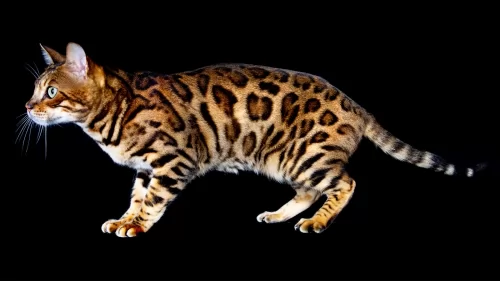 What an exquisite coat the Bengal cat has. It looks like the coat of a wild cat and can have spots, marbling, and rosettes, but it is domesticated, developed from hybrids – the spotted Egyptian Mau and the Asian Leopard cat.
What an exquisite coat the Bengal cat has. It looks like the coat of a wild cat and can have spots, marbling, and rosettes, but it is domesticated, developed from hybrids – the spotted Egyptian Mau and the Asian Leopard cat.
It is the only domestic breed of cat that has rosette markings. It is Jean Mill of California that you associate the Bengal cat with, and she conducted a number of graduate classes in genetics.
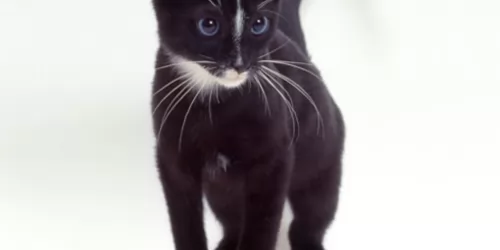 This is a fairly new cat breed that was discovered in New Mexico and its a rare cat. It was in 1984 that the cat was identified.
This is a fairly new cat breed that was discovered in New Mexico and its a rare cat. It was in 1984 that the cat was identified.
There was a feral colony of cats and one particular, a tortoise-shell female was selected to be mated with male cats of no particular description. Her kittens were born with deep-blue eyes, showing that the gene was dominant.
The unusual cat breed was named Ojos Azules which means ‘Blue Eyes’ in Spanish.
The Ojos Azules comes with both short and long hair. The cat was accepted for registration by TICA in 1991.
Only cats with the recognizable deep blue eye gene have been called Ojos Azules.
There was a time when it was discovered that cranial defects could be linked to the gene, and while breeding was temporarily suspended, it is back on track.
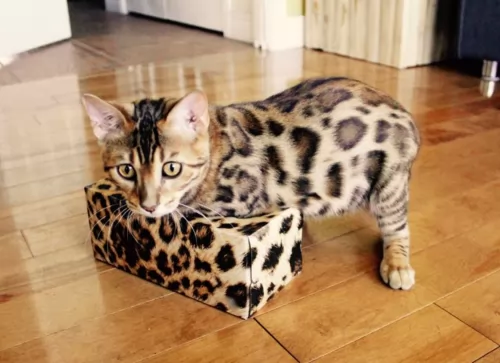 The Bengal looks like a wild cat and it can weigh up to 7kg. It can reach a height of 70cm with long, muscular legs and almond-shaped eyes which are green or blue.
The Bengal looks like a wild cat and it can weigh up to 7kg. It can reach a height of 70cm with long, muscular legs and almond-shaped eyes which are green or blue.
When it comes to the coat of the Bengal cat, it has a wide variety of colors and patterns. The cat can be brown, black, red, grey, spotted, clouded, ticked or rosette.
There are Bengal breeders that claim that their Bengals are hypoallergenic so that they won’t cause an allergic reaction with their owers. This is something that hasn’t been scientifically proved and in fact many will say that there isn’t such as thing as a hypoallergenic cat.
The Bengal is a medium to large-sized cat, being long and lean and muscular. As a low shedder, it is believed the Bengal is a hypoallergenic cat breed – a cat less likely to cause an allergy with its human owners.
When you bring a Bengal cat into your home, you’ll find they are energetic, smart, and playful and they love cavorting around in water.
People who have owned a Bengal say that the cat is friendly and that it enjoys interacting with humans. They’re cats capable of forming strong bonds with their human family, becoming affectionate and loyal. They in turn want to receive lots of loving attention.
They’re intelligent too and are quick to learn. You have to remember that these are part wild cat and that they are only classed as tame from the 4th generation (T4).
The cat has wild traits so it is only natural that it likes to hunt so don’t be alarmed when your Bengal presents you with dead mice, moles, and birds.
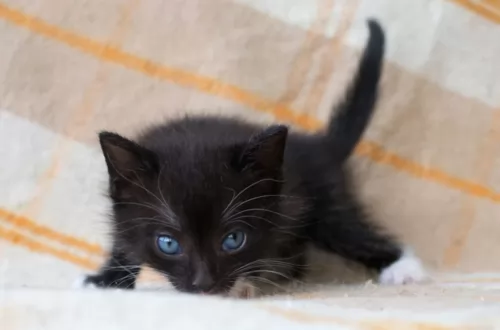 The beautiful Ojos Azules is a medium-sized cat and weighs in at between 3 and 5kg.
The beautiful Ojos Azules is a medium-sized cat and weighs in at between 3 and 5kg.
The cat’s most amazing round blue eyes are one of its most extraordinary features.
The gene in this cat isn’t linked to any particular fur color or pattern, so that means some of these cats will have a black coat but still have the blue eyes. The coat of the cat comes in many colors and is short and silky. Sometimes you’ll find some white markings on the paws and tail.
Not much is known of this cat breed because it is such a rare cat. Very few have owned this cat, but it seems as if, according to the people who have owned them, they are loving, friendly cats.
The small number that have been owned as domestic pets are said to have had balanced, loving temperaments, with the ability to show affection for their human owners.
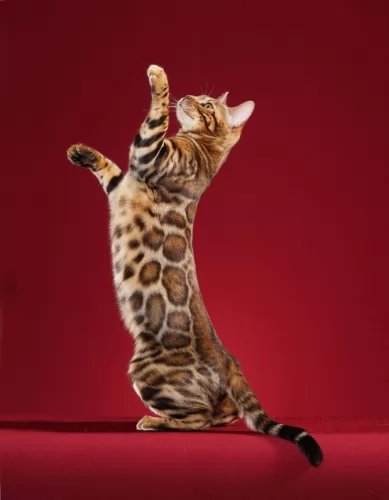 Bengal cats are intelligent and just like a dog he is clever at learning tricks and can even be taught things such as ‘sit’, ‘fetch’ or ‘lie down’. They actually make great companions as they are sensitive to their owner's moods and can even recognize human gestures and adapt their behavior to their owner's mood.
Bengal cats are intelligent and just like a dog he is clever at learning tricks and can even be taught things such as ‘sit’, ‘fetch’ or ‘lie down’. They actually make great companions as they are sensitive to their owner's moods and can even recognize human gestures and adapt their behavior to their owner's mood.
They’re vocal cats too and they like to communicate about their needs, being able to meow in different tones. They’re active cats and they want active owners – those who can spend time with them playing and even going on walks and hikes.
The Bengal certainly is a wonderfully companionable cat.
 The Ojos Azules cat, apart from its amazing eyes, is a regular cat that requires the same devotion from his human family that other cats enjoy.
The Ojos Azules cat, apart from its amazing eyes, is a regular cat that requires the same devotion from his human family that other cats enjoy.
Because this cat is so rare it is unlikely that you have one, but whatever furry feline friend you have, treat it with love and attention. The worst thing humans can do is to buy a pet, become bored with it, and then discard it.
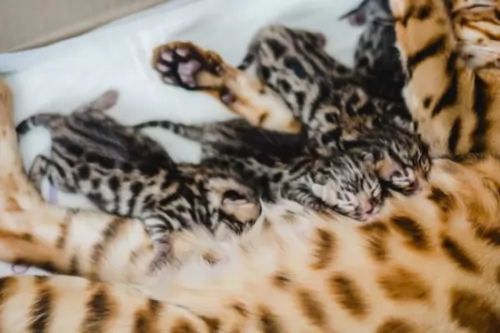 Hypertrophic cardiomyopathy (HCM) is a concern with the Bengal cat breed and this is a disease where the heart muscle becomes thick and unable to pump blood properly.
Hypertrophic cardiomyopathy (HCM) is a concern with the Bengal cat breed and this is a disease where the heart muscle becomes thick and unable to pump blood properly.
It’s a common genetic disease in Bengal cats. Cats used for breeding need to be screened each year to ensure no hypertrophic cardiomyopathy is present.
Another problem with the Bengal cat is Progressive retinal atrophy or PRA. Anyone wanting to breed Bengals should have their cat tested for this eye disease as the disease can lead to blindness.
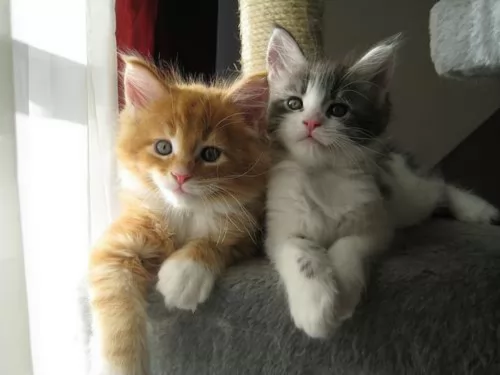 There don’t seem to be too many breed-specific health conditions associated with the Ojos Azules.
There don’t seem to be too many breed-specific health conditions associated with the Ojos Azules.
Having your cat spayed or neutered is beneficial to the cat long-term. Not only that, but it prevents unwanted pregnancies. Thousands of unwanted cats land up in animal shelters or are euthanized every year.
When you bring a new Ojos Azules kitten into the home, you will need to ensure the kitten is vaccinated, but also ensure he is tested for- and free of parasites.
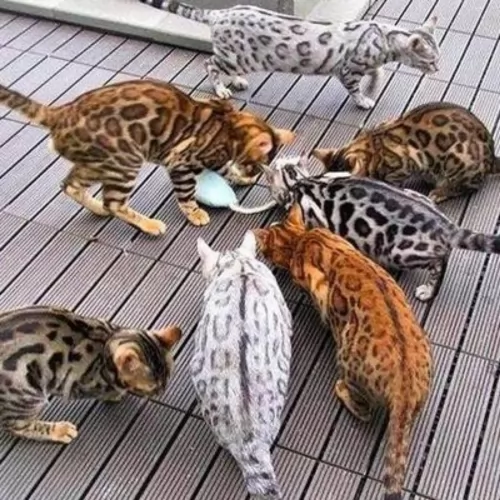 You will need a secured outdoor area for your Bengal cat where he can play and climb. He will need these for his activity levels as well as stimulating toys.
You will need a secured outdoor area for your Bengal cat where he can play and climb. He will need these for his activity levels as well as stimulating toys.
Provide feeding and water bowls and also make sure that you provide your Bengal with a shallow swimming pool as this cat loves water.
The Bengal is a healthy cat breed so it is important to provide your pet cat with the best food there is and to ensure he gets checked out at the vet every year.
Most hybrid breed owners provide raw food as these cats are often sensitive to commercially manufactured food. Having said that, there are high-quality prepared cat foods that will provide your Bengal with everything needed for a healthy life.
Look at providing your pet with a good supplement to ensure your furry friend has every chance to be healthy and happy.
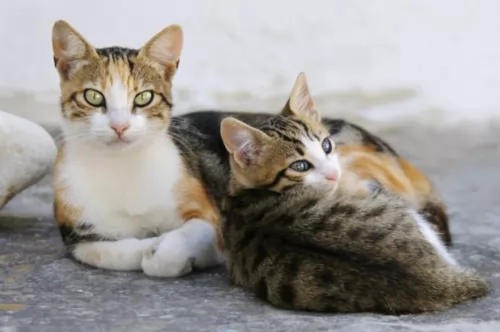 There are no particular requirements when caring for the Ojos Azules. Like other cat breeds, this cat also needs to be loved and well looked after.
There are no particular requirements when caring for the Ojos Azules. Like other cat breeds, this cat also needs to be loved and well looked after.
Contrary to what many people think, a cat isn’t a non-maintenance creature that can look after itself. There are many cat breeds that crave the companionship of their human owners and they need to be looked after carefully.
Ensure the best quality cat foods there are. There are many commercial cat foods and you want the high-quality ones with meat listed as the top ingredient.
A cat is a carnivore and meat is imperative for your cat to be healthy. If you feed your cat one of the commercially manufactured cat foods there are, you’ll find the food comes as dry, semi-moist, and canned.
The food you choose will come down to you and your cat’s preferences. If in any kind of doubt, speak to your local vet for recommendations. Remember, that an old cat, a pregnant cat or an ill cat will require a certain type of food.
You’ll need to coax your cat to use a litter box. The litter box should be in a quiet place where he can do his business in peace. Make sure you have the tools to scoop out your cat’s feces every single day. Cats like a clean litter box.
Provide the cat with a scratching post. If you have a cat as a pet, you must know it will scratch. You can’t change your cat’s behavior but you can do something about it to deter your cat scratching your furniture. You can buy him a scratching post so that he can scratch the way all cats do.